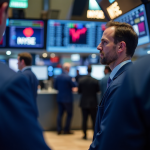
OpenAI CEO Sam Altman believes the artificial intelligence market is currently experiencing a bubble, The Verge said in a report.
“When bubbles happen, smart people get overexcited about a kernel of truth,” Altman was quoted as saying in a CNBC report.
Are we in a phase where investors as a whole are overexcited about AI? My opinion is yes. Is AI the most important thing to happen in a very long time? My opinion is also yes.
Altman drew a comparison between the current situation and the well-known dot-com bubble, a stock market collapse in the late 1990s driven by immense investor excitement for internet companies.
From March 2000 to October 2002, the Nasdaq experienced an almost 80% decline in value as many of these companies failed to generate revenue or profits.
Experts are divided on AI investment risk
A number of experts and analysts, including Alibaba co-founder Joe Tsai, Bridgewater Associates’ Ray Dalio, and Apollo Global Management chief economist Torsten Slok, have expressed increasing concern that AI investment is accelerating too rapidly.
These comments echo similar warnings from others in the field.
Last month, Slok’s report claimed that the current AI bubble surpasses the internet bubble in size.
He argued that the top 10 S&P 500 companies are more overvalued now than they were in the 1990s.
Ray Wang, CEO of Constellation Research, a Silicon Valley firm, told CNBC that while Altman’s comments hold some validity, the associated risks vary depending on the company.
He said:
From the perspective of broader investment in AI and semiconductors…I don’t see it as a bubble. The fundamentals across the supply chain remain strong, and the long-term trajectory of the AI trend supports continued investment.
However, he also noted a growing trend of speculative investment in companies with weaker fundamentals and merely perceived potential, potentially leading to areas of overvaluation.
Concerns about an AI bubble intensified earlier this year following the release of a competitive reasoning model by Chinese startup DeepSeek.
Challenges and shifting AI outlook
The company asserted that one iteration of its advanced large language models was trained for less than $6 million, a mere fraction of the billions invested by US AI industry leaders such as OpenAI.
However, these claims were met with some doubt.
OpenAI is projected to exceed $20 billion in annual recurring revenue this year, yet it remains unprofitable, as stated by Altman earlier this month.
OpenAI’s recent release of its GPT-5 AI model faced criticism for being less intuitive, leading the company to reinstate access to older GPT-4 models for its paying customers.
Following the model’s release, Altman has expressed increased caution regarding some of the AI industry’s more optimistic forecasts.
In an interview with CNBC, he commented on the declining relevance of the term “artificial general intelligence” or “AGI,” in response to a question about whether the GPT-5 model brings the world closer to achieving AGI.
Artificial General Intelligence (AGI) is a concept of AI capable of performing any intellectual task a human can.
OpenAI has been pursuing this for years, with Altman suggesting its achievement is in the “reasonably close-ish future.”
The post OpenAI CEO Sam Altman calls AI market a bubble appeared first on Invezz






